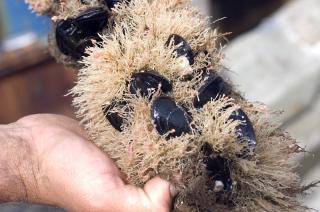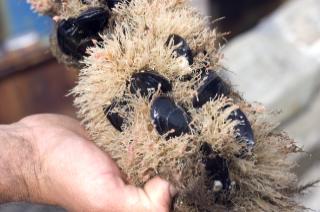More than half the nitrogen polluting Great Ponds along the south shore is coming from wastewater, a newly released report has found.
Marine Biological Laboratory
2022
2015
The Vineyard’s first offshore blue mussel farm has a new owner with a long-term vision for the local fishing industry. Stanley Larsen, owner of Menemsha Fish Market, recently took over a shellfish grant for the continued operation of the aquaculture farm.
2013
In an effort to spread the success of raising mussels offshore, local Vineyard commercial fishermen and shellfishermen are being invited to a special workshop on mussel farming on Friday, May 17 in Rhode Island.
2010
The first blue mussels on the experimental offshore mussel farm in Vineyard waters will be harvested in the coming weeks. The mussels are large enough to go to market, according to Scott Lindell, an aquaculture specialist with the Woods Hole Marine Biological Laboratory.
There are two small farms. One is north of Chilmark; the second is west of Noman’s Land. Two Island fishermen, Alec Gale of West Tisbury and Tim Broderick of Chilmark, are tending the farms with a 55-foot workboat, the Jane Lee, out of Menemsha.
2007
Ever since cultivation began on the Vineyard, farmers have tried to enrich the nutrient-poor soils of the Island's sandplain grassland. Now scientists are beginning a five-year experiment on the Island trying to achieve the exact opposite.
At a cost of some $700,000, The Nature Conservancy and Marine Biological Laboratory will try various ways of de-enriching the soil on 70 acres of sandplain at Katama, with an eye toward reestablishing the grassland ecosystem which formerly existed there.




